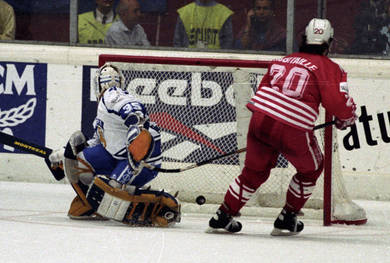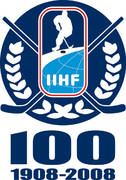

Story #45 Luc Robitaille the hero as Canada wins first World Championship in 33 yearsMay 8, 1994 — Milan, Italy
It is inconceivable that Canada, a country virtually unbeatable for the first 30 years of IIHF history, all of a sudden could not win a gold medal at the World Championship. But after the Trail Smoke Eaters won in 1961, year after year passed, and Canada failed to win gold. The 1960s was a time of amateur hockey for Canada, but in 1977 the IIHF allowed all pros to play internationally and Canada was back in international hockey after a six-year abscence. Still, Canada failed to win. Many times the teams Canada sent over were ill-prepared, often with poor attitude, but most often the simple truth was that the Soviet teams were too good.  In the semi-finals, Canada hammered Sweden 6-0, thanks to a hat trick from Robitaille, four assists from Steve Thomas, and a shutout from Bill Ranford. This put Canada in the gold-medal game against Finland, which had advanced with a 10-0 slaughter of Austria in the quarter-finals and another pasting in the semis, this time 8-0 against USA. About the Top 100 StoriesAs part of the IIHF's 100th anniversary celebrations, www.IIHF.com is featuring the 100 top international hockey stories from the past century (1908-2008). Starting now and continuing through the 2008 IIHF World Championships in Canada, we will bring you approximately three stories a week counting down from Number 100 to Number 11.
The Final Top 10 Countdown will be one of the highlights of the IIHF's Centennial Gala Evening in Quebec City on May 17, the day prior to the Gold Medal Game of the 2008 World Championship.
These are the criteria for inclusion on this list: First, the story has to have had a considerable influence on international hockey. Second, it has to have had either a major immediate impact or a long-lasting significance on the game. Third, although it doesn't necessarily have to be about top players, the story does have to pertain to the highest level of play, notably Olympics, World Championships, and the like. The story can be about a single moment — a goal, a great save, a referee's call — or about an historic event of longer duration — a game, series, tournament, or rule change. |
 Click here for the 100 Top Stories
|
|






